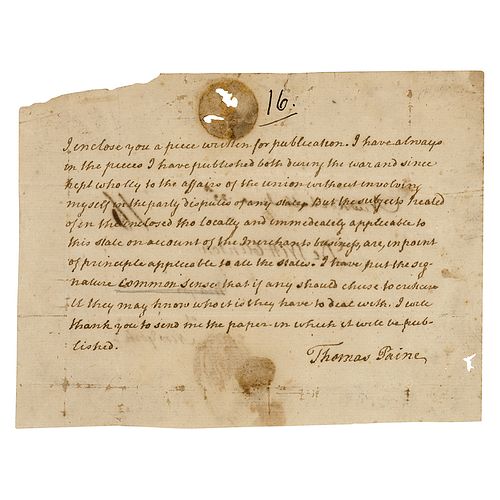Thomas Paine Autograph Letter Signed on 'Common Sense' Article
Two ways to bid:
- Leave a max absentee bid and the platform will bid on your behalf up to your maximum bid during the live auction.
- Bid live during the auction and your bids will be submitted real-time to the auctioneer.
Bid Increments
| Price | Bid Increment |
|---|---|
| $0 | $5 |
| $50 | $10 |
| $200 | $25 |
| $500 | $50 |
About Auction
Aug 16, 2023
RR Auction's August Fine Autographs and Artifacts sale brings nearly 750 lots to the auction block, with a special focus on the collection of Dr. Charles Ronald Bauer—an in-person collector who focused on entertainment's elite. RR Auction support@rrauction.com
- Lot Description
ALS signed "Thomas Paine," one page, 7 x 5.25, no date but docketed June 23, [1806?]. Handwritten letter to DeWitt Clinton, mayor of New York City. In full: "I enclose you a piece written for publication. I have always in the pieces I have published both during the war and since kept wholly to the affairs of the union without involving myself in the party disputes of any state. But the subjects treated of in the enclosed tho locally and immediately applicable to this state on account of the merchants business, are, in point of principle applicable to all the states. I have put the signature Common Sense that if any should chuse to criticize it they may know who it is they have to deal with. I will thank you to send me the paper in which it will be published." Addressed on the reverse in Paine's hand. In very good to fine condition, with some minor paper loss, affecting none of the handwriting.
Previously sold: The James S. Copley Library: Magnificent American, Historical Documents: Second Selection (Sotheby's, Lot 646, October 15, 2010); Elsie O. and Philip D. Sang Foundation (Sotheby Parke Bernet, Lot 533, November 14, 1978).
The Sang Foundation sale catalog dates this letter to 1803, but it seems much more likely to be from 1806. Following Paine's return to America in 1802, after fifteen years of exile in England and France, he published seven essays under his celebrated pseudonym, "Common Sense." Of these, his essay entitled "A Challenge to the Federalists to Declare Their Principles" is the most likely to be the one referred to in the present letter. Published in New York City's American Citizen, an influential Republican newspaper, on October 17, 1806, the editorial calls for the Federalists to offer clarity on their platform. Paine declares: 'When men form themselves into political parties, it is customary with them to make a declaration of their principles.—But the feds do not declare what their principles are; from which we may infer, that either they have no principles, and are mere snarlers, or that their principles are too bad to be told. Their object, however, is to get possession of power; and their caution is to conceal the use they will make of it. Such men ought not to be trusted.' He further predicts that the Federalists, should they come into power, would burden the country's citizens with heavy taxes and involve the United States in an unnecessary war with France and Spain. A remarkable autographed letter signed by Thomas Paine, evoking the iconic "Common Sense" moniker made famous during the Revolutionary War. - Shipping Info
-
Bidder is liable for shipping and handling and providing accurate information as to shipping or delivery locations and arranging for such. RR Auction is unable to combine purchases from other auctions or affiliates into one package for shipping purposes. Lots won will be shipped in a commercially reasonable time after payment in good funds for the merchandise and the shipping fees are received or credit extended, except when third-party shipment occurs. Bidder agrees that service and handling charges related to shipping items which are not pre-paid may be charged to a credit card on file with RR Auction. Successful international Bidders shall provide written shipping instructions, including specified Customs declarations, to RR Auction for any lots to be delivered outside of the United States. NOTE: Declaration value shall be the item’(s) hammer price and RR Auction shall use the correct harmonized code for the lot. Domestic Bidders on lots designated for third-party shipment must designate the common carrier, accept risk of loss, and prepay shipping costs.
-
- Buyer's Premium



 EUR
EUR CAD
CAD AUD
AUD GBP
GBP MXN
MXN HKD
HKD CNY
CNY MYR
MYR SEK
SEK SGD
SGD CHF
CHF THB
THB












